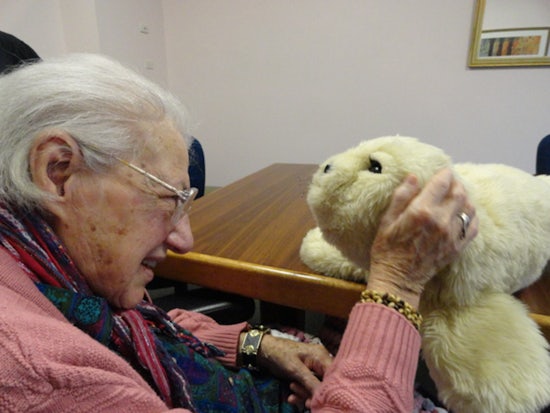New research shows that robotic animals could be the way to go in dementia care
A recent study released by Australia’s Griffith University has shown ‘modest but significant benefit’ in the use of animal robots in the care of people with dementia

Mercy Place Abbotsford resident Kathleen Sullivan, 90, reaping the benefits of Paro (Source: Mercy Health)
Published in the Journal of American Medical Directors Association (JAMDA), the study follows on previous research by Professor Wendy Moyle and her team at Griffith’s Menzies Health Institute Queensland which showed that the introduction of a robotic seal called ‘Paro’ could bring positive benefits for people with dementia, including reduced anxiety and decreased tendency to wander.
This latest study, supported by National Health and Medical Research Council (NHMRC) funding, used Paro – who can respond to touch, temperature, voice and even learn to respond to its name – and compared the use of the robotic animal to a soft toy (Paro with features disabled) and continued routine facility care as usual; monitoring changes in residents’ levels of engagement with the toy or robot, mood states and agitation over a 10-week period.
“We found that residents in the Paro group were significantly more verbally and visually engaged with the Paro than those in the plush toy group, suggesting that the robotics were beneficial,” Professor Moyle says.
“Clinically, the differences between the two groups were small for verbal engagement – talking to the robot or plush toy – but more pronounced than visual engagement – looking at Paro or plush toy – suggesting that the residents were stimulated by verbal responses from Paro.
“Both Paro and plush toy groups were more effective than usual routine care, producing greater reductions in residents’ display of neutral affect. Paro, however, was specifically more effective than usual routine care in improving residents’ expression of pleasure.”
As seen by Professor Moyle in the study findings, one Victorian nursing home’s staff, volunteers and residents experienced for themselves, throughout the month of July, the positive impact of the robotic seal in aged care facilities, and in particular on those living with dementia.
Aged Care Lifestyle and Volunteer Manager at Mercy Place Abbotsford, Karren Gooding, says the therapeutic robot seal was ‘well received’ by all residents and staff, but particularly by those living with dementia.
“Paro is an incredible piece of technology,” she explains. “In many ways the robot behaves as any seal pup would – it blinks, responds to touch, makes eye contact with residents and is receptive to emotions.
“This kind of connection has a significant impact on the behaviour and temperament of those living with dementia. Many of who experience frustration, confusion and agitation.
“Mercy Health is committed to incorporating innovative practices to improve health and wellbeing outcomes for residents, and this is just one example of how technology and animal therapy working together can have a positive impact within our homes.”
Regis Care’s General Manager, Investor Relations and Corporate Services Kirsty Nottle also knows first hand the positive impact Paro can have in aged and dementia care after taking part in a trail of the robot in 2015 and later rolling it’s use out across all of their locations.
While hands on experience from facilities such as Regis Care and Mercy Health and the research findings from Griffith University do have positive results, Professor Moyle stresses that “A robotic animal such as Paro should not be used to replace staff time, but rather be used during those inevitable periods when staff are otherwise preoccupied or when the individual may benefit from comfort and stimulation.
“Staff need to fully understand how to use Paro and its technology before it can be effectively used with people with dementia.”
Professor Moyle also states that the study has added important understandings to the use of robotic animals with people with dementia in long-term care, and that further research is now needed that looks to identify the characteristics of people who will benefit from the Paro robot and plush toy.
Professor Moyle says that the study findings support the effectiveness of Paro, but with a cost of $8,500 attached, she also suggest that where there are limited resources, a soft toy animal may be used effectively with a person with dementia.























